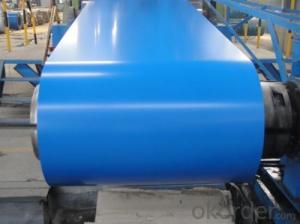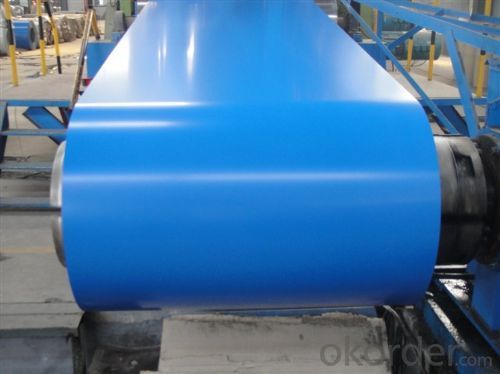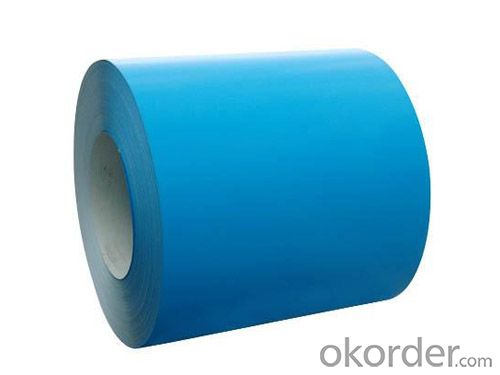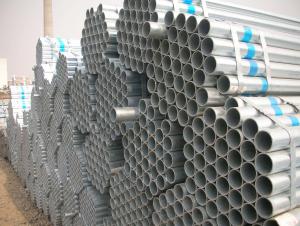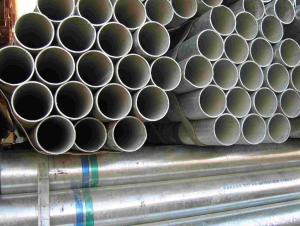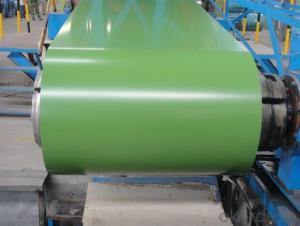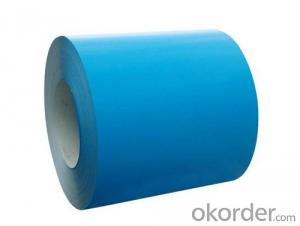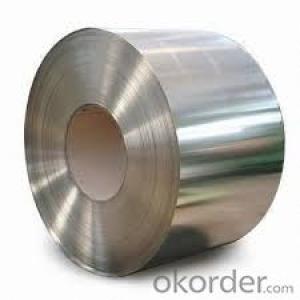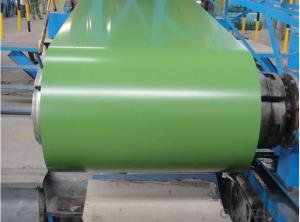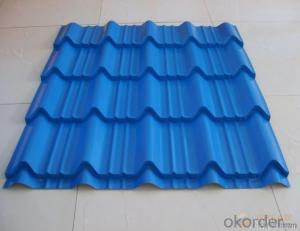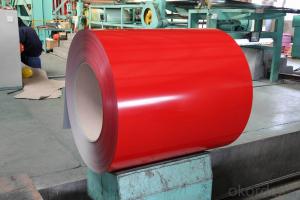High Quality of Prepainted Steel Coil from China
- Loading Port:
- Tianjin
- Payment Terms:
- TT OR LC
- Min Order Qty:
- 50 m.t.
- Supply Capability:
- 100000 m.t./month
OKorder Service Pledge
OKorder Financial Service
You Might Also Like
1. Pre-Painted Galvanized/Aluzinc Steel Coil Description:
With GI as base material, after pretreatment (degrease and chemical treatment ) and liquid dope with several layers of color, then after firing and cooling, finally the plate steel is called pre-painted galvanized (aluzinc) steel. Pre-painted galvanized steel is good capable of decoration, molding, corrosion resistance. It generally displays superior workability, durability and weather resistance.
2.Main Features of the Pre-Painted Galvanized/Aluzinc Steel Coil:
• Excellent process capability
• Smooth and flat surface
• Workability, durability
• Excellent heat resistance performance
• High strength
• Good formability
• Good visual effect
3.Pre-Painted Galvanized/Aluzinc Steel Coil Images
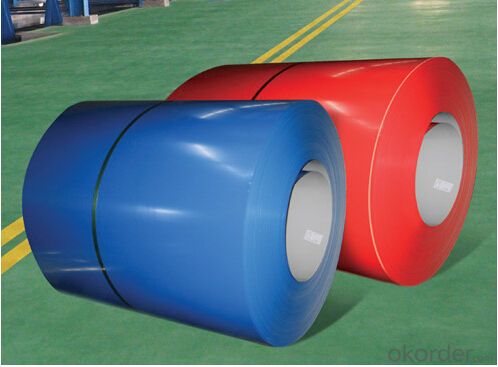
4.Pre-Painted Galvanized/Aluzinc Steel Coil Specification
Standard: AISI, ASTM, BS, DIN, GB, JIS
Grade: DX51D, DX52D
Thickness: 0.17-2.0mm
Brand Name: KMRLON
Model Number: coil
Type: Steel Coil
Technique: Cold Rolled
Surface Treatment: Coated
Application: Boiler Plate
Special Use: High-strength Steel Plate
Width: 20-1250mm
Length: customized
commoidty: pre-painted galvanized steel coil
Thickness: 0.13-4.0mm
width: 20-1250mm
zinc coating: 40-180g/m2
printing thickness: top side: 20+/-5 microns, back side: 5-7 microns
color: all RAL color
surface treatment: color coated
coil weight: 4-7 tons
coil ID: 508/610mm
packaging: standard seaworthy packing
5.FAQ of Pre-Painted Galvanized/Aluzinc Steel Coil
What’s the application of this product?
Roof, roof structure, surface sheet of balcony, frame of window, etc.
What’s the brand of the paint?
We use the best brand of all of the word—AKZO.
- Q: What are the different methods of pipe protection for steel pipes?
- Steel pipes can be protected in various ways, each with its own purpose and level of defense. Some commonly used methods include: 1. Coatings: To shield steel pipes from corrosion and environmental factors, coatings are applied to the outer surface. These can be paints, epoxies, or polymers that create a barrier between the pipe and its surroundings, preventing contact with corrosive elements. 2. Wrapping: Another method involves using materials like tape or shrink wrap to cover the steel pipe, providing a physical barrier against moisture, chemicals, and corrosive substances. Wrapping is often combined with coatings to enhance protection. 3. Cathodic Protection: This electrochemical method safeguards steel pipes from corrosion by connecting them to a sacrificial anode, typically made of zinc or magnesium. The anode corrodes instead of the pipe, preventing deterioration. It is commonly used for buried or submerged pipelines. 4. Thermal Insulation: Steel pipes exposed to extreme temperatures can be protected with thermal insulation. Materials like foam or mineral wool are applied around the pipe to minimize heat transfer. This is particularly important for pipes carrying hot fluids or in harsh weather conditions. 5. Vibration Dampening: Vibrations can damage steel pipes by causing stress and fatigue. To counter this, techniques like vibration damping pads or supports and clamps can be used. These methods absorb and dissipate the energy generated by vibrations, reducing the risk of pipe failure. 6. Concrete Coating: For pipelines installed underwater or in highly corrosive environments, concrete coating is often employed. A layer of concrete or cement-based mortar is applied to the steel pipe, providing both mechanical protection and resistance to corrosion. Choosing the appropriate method of pipe protection depends on the specific application, environmental conditions, and desired level of defense. Regular inspection and maintenance are also crucial in maintaining the long-term integrity of steel pipes.
- Q: How are steel pipes classified according to their wall thickness?
- Steel pipes are classified according to their wall thickness into three categories: standard weight, extra-strong, and double extra-strong.
- Q: Can steel pipes be used for electrical conduits?
- No, steel pipes cannot be used for electrical conduits. Electrical conduits need to be made of materials that are non-conductive and provide protection for the electrical wiring. Steel is a conductive material, so it poses a risk of electric shock and can cause interference with the electrical signals.
- Q: Can steel pipes be used for desalination plants?
- Yes, steel pipes can be used for desalination plants. Steel is often chosen for its high strength, durability, and resistance to corrosion, making it suitable for carrying and transporting the highly saline water used in desalination processes. Additionally, steel pipes can handle high pressure, ensuring efficient water flow throughout the plant.
- Q: How are steel pipes used in oil and gas industry?
- Steel pipes are extensively used in the oil and gas industry for various purposes such as drilling, production, transportation, and refining. They are primarily used for the extraction of oil and gas from the ground, as well as for the transportation of these resources over long distances. Steel pipes are also utilized in the construction of storage tanks, refineries, and offshore drilling platforms. Their strength, durability, and resistance to corrosion make them ideal for withstanding the harsh conditions encountered in the oil and gas industry.
- Q: Are steel pipes suitable for transporting gas?
- Yes, steel pipes are suitable for transporting gas. Steel pipes are known for their durability, strength, and resistance to corrosion, making them a reliable choice for transporting various types of gases, including natural gas, oil, and other flammable substances. Additionally, steel pipes can handle high pressure and temperature conditions, ensuring the safe and efficient transportation of gas over long distances.
- Q: How are steel pipes insulated against heat loss?
- Steel pipes can be insulated against heat loss using several methods. One common method is through the use of insulation materials such as mineral wool or fiberglass wraps. These materials are wrapped around the pipes to create a barrier that reduces heat transfer. Another method is the application of insulation coatings, such as foam or rubber coatings, directly onto the surface of the pipes. These coatings create a protective layer that minimizes heat loss. Additionally, thermal tape or heat-resistant tape can be used to seal any gaps or joints in the insulation, ensuring a continuous barrier against heat loss. Overall, insulating steel pipes against heat loss is essential to maintain the temperature of the fluid or gas being transported and to increase energy efficiency in various industries.
- Q: Can steel pipes be used for solar energy systems?
- Yes, steel pipes can be used for solar energy systems. Steel pipes are often used for the construction of solar water heating systems, solar thermal collectors, and solar panel mounting structures. They are durable, cost-effective, and provide the necessary support for various components of a solar energy system.
- Q: How are steel pipes made?
- Steel pipes are made through a process called seamless or welded pipe manufacturing. In seamless manufacturing, a solid steel billet is heated and pierced to form a hollow tube. It is then stretched and rolled to the desired diameter and wall thickness. Welded pipes are made by bending and welding a steel plate or strip to form a cylindrical shape. The welded seam is then heat-treated to ensure its strength and durability. Both processes involve subsequent finishing and inspection to meet the required specifications and quality standards.
- Q: How do steel pipes handle chemical substances?
- Steel pipes are highly resistant to chemical substances due to their inherent strength and durability. They can effectively handle a wide range of chemical substances without corroding or degrading. Additionally, steel pipes can be further protected by coatings or linings to enhance their resistance to specific chemicals.
Send your message to us
High Quality of Prepainted Steel Coil from China
- Loading Port:
- Tianjin
- Payment Terms:
- TT OR LC
- Min Order Qty:
- 50 m.t.
- Supply Capability:
- 100000 m.t./month
OKorder Service Pledge
OKorder Financial Service
Similar products
Hot products
Hot Searches
Related keywords
